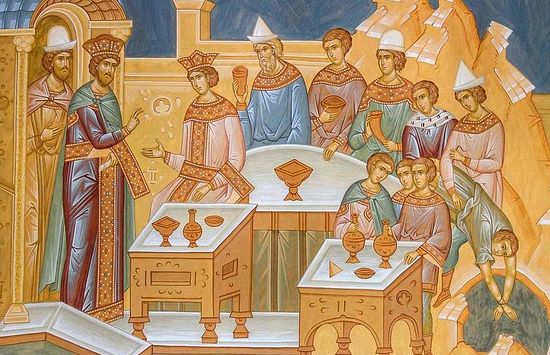DAILY MEDITATION: "And now everything is ready; come then, to the wedding feast"
Liturgical day: Thursday 20th in Ordinary Time
 Gospel text (Mt 22,1-14): Jesus began to address the chief priests and elders of the people, once more using parables: "This story throws light on the kingdom of heaven. A king celebrated the wedding of his son. He sent his servants to call the invited guests to the wedding feast, but the guests refused to come. Again he sent other servants ordering them to say to the invited guests: ‘I have prepared a banquet, slaughtered my fattened calves and other animals, and now everything is ready; come then, to the wedding feast’. But they paid no attention and went away, some to their fields, and others to their work. While the rest seized the servants of the king, insulted them and killed them. The king became angry. He sent his troops to destroy those murderers and burn their city.
Gospel text (Mt 22,1-14): Jesus began to address the chief priests and elders of the people, once more using parables: "This story throws light on the kingdom of heaven. A king celebrated the wedding of his son. He sent his servants to call the invited guests to the wedding feast, but the guests refused to come. Again he sent other servants ordering them to say to the invited guests: ‘I have prepared a banquet, slaughtered my fattened calves and other animals, and now everything is ready; come then, to the wedding feast’. But they paid no attention and went away, some to their fields, and others to their work. While the rest seized the servants of the king, insulted them and killed them. The king became angry. He sent his troops to destroy those murderers and burn their city.
"Then he said to his servants: ‘The wedding banquet is prepared, but the invited guests were not worthy. Go, then, to the crossroads and invite everyone you find to the wedding feast’. The servants went out at once into the streets and gathered everyone they found, good and bad alike, so that the hall was filled with guests. The king came in to see those who were at table, and he noticed a man not wearing the festal garment. So he said to him: ‘Friend, how did you get in without the wedding garment?’ But the man remained silent. So the king said to his servants: ‘Bind his hands and feet and throw him into the dark where there is weeping and gnashing of teeth’. Know that many are called, but few are chosen".
"I have prepared a banquet, slaughtered my fattened calves and other animals, and now everything is ready; come then, to the wedding feast"
Fr. David AMADO i Fernández
(Barcelona, Spain)
Today, the evangelic parable speaks of the banquet of the Kingdom. It is a recurrent example in Jesus' preaching. It has to do with that wedding feast that will happen at the end of time and that will be the union of Jesus with his Church. She is Christ's spouse that walks in our world but which will finally espouse his Beloved forever and ever. God Father has prepared that feast and He wants all men to be present. This is why He says to all of us «come to the wedding feast!» (Mt 22, 4).
Notwithstanding, the parable has a tragic development, as many "paid no attention and went away, some to their fields, and others to their work..." (Mt 22, 5). This is why, every day, God's mercy is, more often, addressed to the most distant persons. This is like the groom going to get married and invites his family and friends. But they do not wish to go; in view of what he decides to call his acquaintances and co-workers, but they come out with excuses; so finally, he calls the first persons he meets, because he has prepared a banquet and he wants to have guests at his table. Something very similar happens with God.
But the different characters appearing in the parable may also be images of the different states of our soul. Thanks to the grace of baptism we are God's friends and inheritors along with Christ: we have a place reserved for us in this banquet. If, however, we forget our condition of sons, God proceeds to treat us as acquaintances while maintaining his invitation. If we let the grace within us to die, then we become people found in any crossroad, just passers-by without a penny in matters of the Kingdom. Yet, God keeps on calling us.
His call may reach us any time. It is by personal invitation. Nobody has any right to be there. It is God who finds us and tells us: "Come to the wedding!". And we have to receive this invitation with words and facts. This is why that guest who was not properly dressed is thrown out: "Friend, how did you get in without the wedding garment?" (Mt 22, 12).
Source: evangeli.net

